Men's Sheds Intervention: Social Determinants of Health & Well-being
VerifiedAdded on 2023/06/17
|9
|3013
|482
Essay
AI Summary
This essay explores the Men's Sheds intervention, a gender-based approach originating in Australia, and its impact on men's health and well-being. It examines how this intervention, which involves men participating in meaningful activities within a group setting, addresses factors contributing to lower life expectancy and poorer health outcomes in men. The essay discusses the social determinants of health that influence the success of Men's Sheds, including the provision of safe spaces, opportunities for skill-sharing, and reduction of social isolation. Furthermore, it highlights the intervention's benefits in combating mental health issues, reducing substance use, and fostering a sense of belonging, particularly for older men experiencing social withdrawal and chronic illnesses, emphasizing the role of community-based approaches in promoting overall health and improving the quality of life.

Promoting health and
well-being
well-being
Paraphrase This Document
Need a fresh take? Get an instant paraphrase of this document with our AI Paraphraser

Table of Contents
INTRODUCTION...........................................................................................................................3
MAIN BODY...................................................................................................................................3
CONCLUSION................................................................................................................................3
REFERENCES................................................................................................................................4
INTRODUCTION...........................................................................................................................3
MAIN BODY...................................................................................................................................3
CONCLUSION................................................................................................................................3
REFERENCES................................................................................................................................4
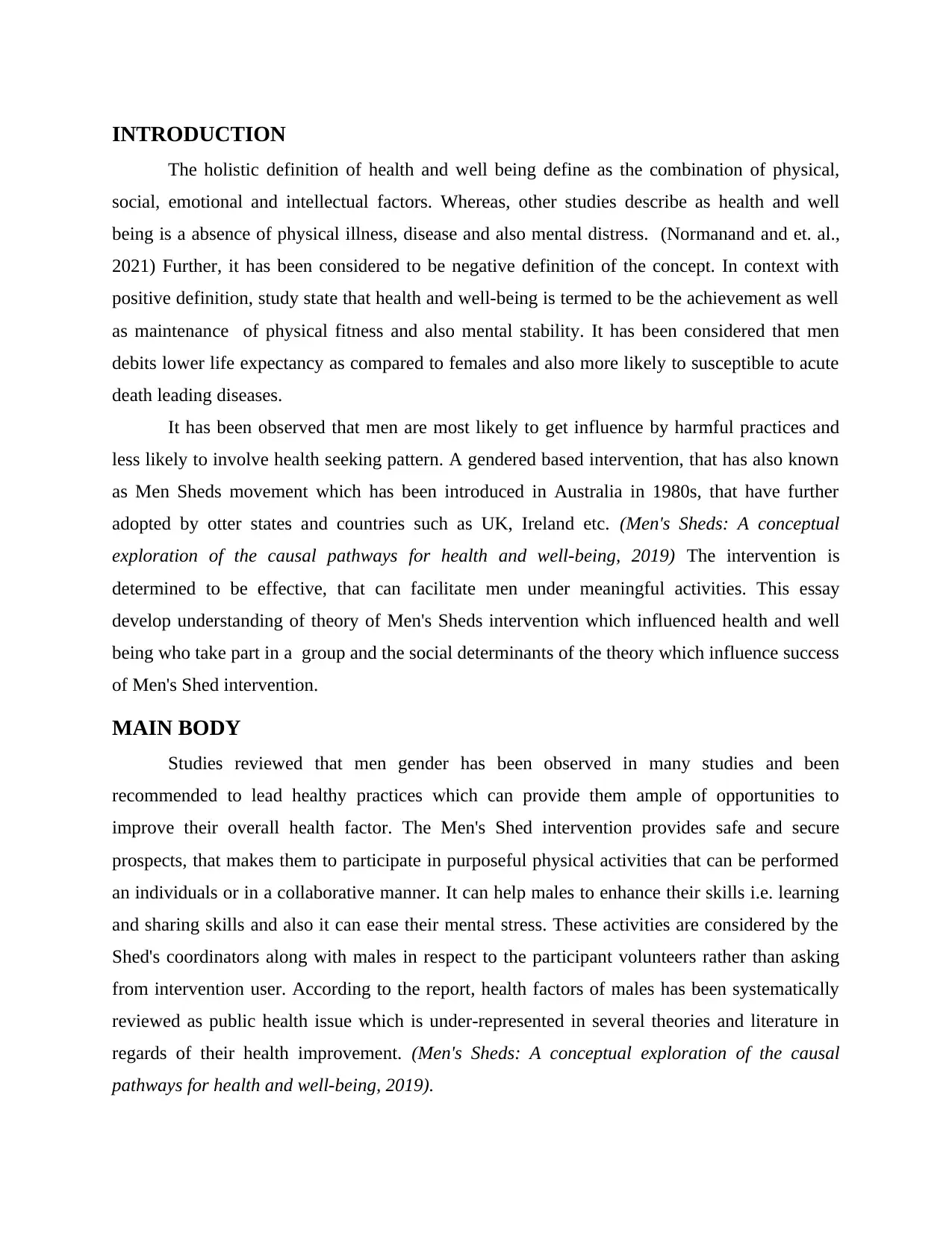
INTRODUCTION
The holistic definition of health and well being define as the combination of physical,
social, emotional and intellectual factors. Whereas, other studies describe as health and well
being is a absence of physical illness, disease and also mental distress. (Normanand and et. al.,
2021) Further, it has been considered to be negative definition of the concept. In context with
positive definition, study state that health and well-being is termed to be the achievement as well
as maintenance of physical fitness and also mental stability. It has been considered that men
debits lower life expectancy as compared to females and also more likely to susceptible to acute
death leading diseases.
It has been observed that men are most likely to get influence by harmful practices and
less likely to involve health seeking pattern. A gendered based intervention, that has also known
as Men Sheds movement which has been introduced in Australia in 1980s, that have further
adopted by otter states and countries such as UK, Ireland etc. (Men's Sheds: A conceptual
exploration of the causal pathways for health and well-being, 2019) The intervention is
determined to be effective, that can facilitate men under meaningful activities. This essay
develop understanding of theory of Men's Sheds intervention which influenced health and well
being who take part in a group and the social determinants of the theory which influence success
of Men's Shed intervention.
MAIN BODY
Studies reviewed that men gender has been observed in many studies and been
recommended to lead healthy practices which can provide them ample of opportunities to
improve their overall health factor. The Men's Shed intervention provides safe and secure
prospects, that makes them to participate in purposeful physical activities that can be performed
an individuals or in a collaborative manner. It can help males to enhance their skills i.e. learning
and sharing skills and also it can ease their mental stress. These activities are considered by the
Shed's coordinators along with males in respect to the participant volunteers rather than asking
from intervention user. According to the report, health factors of males has been systematically
reviewed as public health issue which is under-represented in several theories and literature in
regards of their health improvement. (Men's Sheds: A conceptual exploration of the causal
pathways for health and well-being, 2019).
The holistic definition of health and well being define as the combination of physical,
social, emotional and intellectual factors. Whereas, other studies describe as health and well
being is a absence of physical illness, disease and also mental distress. (Normanand and et. al.,
2021) Further, it has been considered to be negative definition of the concept. In context with
positive definition, study state that health and well-being is termed to be the achievement as well
as maintenance of physical fitness and also mental stability. It has been considered that men
debits lower life expectancy as compared to females and also more likely to susceptible to acute
death leading diseases.
It has been observed that men are most likely to get influence by harmful practices and
less likely to involve health seeking pattern. A gendered based intervention, that has also known
as Men Sheds movement which has been introduced in Australia in 1980s, that have further
adopted by otter states and countries such as UK, Ireland etc. (Men's Sheds: A conceptual
exploration of the causal pathways for health and well-being, 2019) The intervention is
determined to be effective, that can facilitate men under meaningful activities. This essay
develop understanding of theory of Men's Sheds intervention which influenced health and well
being who take part in a group and the social determinants of the theory which influence success
of Men's Shed intervention.
MAIN BODY
Studies reviewed that men gender has been observed in many studies and been
recommended to lead healthy practices which can provide them ample of opportunities to
improve their overall health factor. The Men's Shed intervention provides safe and secure
prospects, that makes them to participate in purposeful physical activities that can be performed
an individuals or in a collaborative manner. It can help males to enhance their skills i.e. learning
and sharing skills and also it can ease their mental stress. These activities are considered by the
Shed's coordinators along with males in respect to the participant volunteers rather than asking
from intervention user. According to the report, health factors of males has been systematically
reviewed as public health issue which is under-represented in several theories and literature in
regards of their health improvement. (Men's Sheds: A conceptual exploration of the causal
pathways for health and well-being, 2019).
⊘ This is a preview!⊘
Do you want full access?
Subscribe today to unlock all pages.

Trusted by 1+ million students worldwide
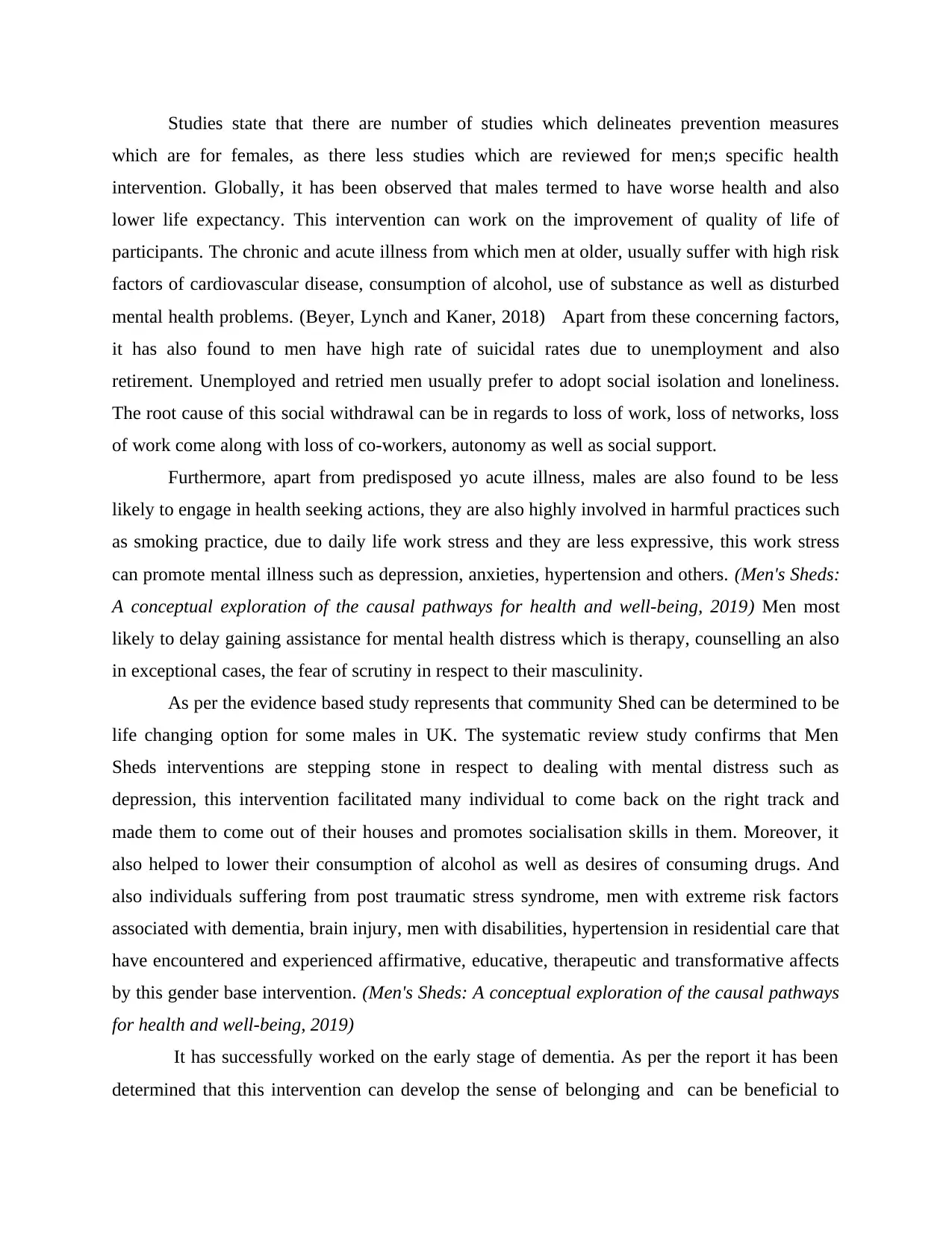
Studies state that there are number of studies which delineates prevention measures
which are for females, as there less studies which are reviewed for men;s specific health
intervention. Globally, it has been observed that males termed to have worse health and also
lower life expectancy. This intervention can work on the improvement of quality of life of
participants. The chronic and acute illness from which men at older, usually suffer with high risk
factors of cardiovascular disease, consumption of alcohol, use of substance as well as disturbed
mental health problems. (Beyer, Lynch and Kaner, 2018) Apart from these concerning factors,
it has also found to men have high rate of suicidal rates due to unemployment and also
retirement. Unemployed and retried men usually prefer to adopt social isolation and loneliness.
The root cause of this social withdrawal can be in regards to loss of work, loss of networks, loss
of work come along with loss of co-workers, autonomy as well as social support.
Furthermore, apart from predisposed yo acute illness, males are also found to be less
likely to engage in health seeking actions, they are also highly involved in harmful practices such
as smoking practice, due to daily life work stress and they are less expressive, this work stress
can promote mental illness such as depression, anxieties, hypertension and others. (Men's Sheds:
A conceptual exploration of the causal pathways for health and well-being, 2019) Men most
likely to delay gaining assistance for mental health distress which is therapy, counselling an also
in exceptional cases, the fear of scrutiny in respect to their masculinity.
As per the evidence based study represents that community Shed can be determined to be
life changing option for some males in UK. The systematic review study confirms that Men
Sheds interventions are stepping stone in respect to dealing with mental distress such as
depression, this intervention facilitated many individual to come back on the right track and
made them to come out of their houses and promotes socialisation skills in them. Moreover, it
also helped to lower their consumption of alcohol as well as desires of consuming drugs. And
also individuals suffering from post traumatic stress syndrome, men with extreme risk factors
associated with dementia, brain injury, men with disabilities, hypertension in residential care that
have encountered and experienced affirmative, educative, therapeutic and transformative affects
by this gender base intervention. (Men's Sheds: A conceptual exploration of the causal pathways
for health and well-being, 2019)
It has successfully worked on the early stage of dementia. As per the report it has been
determined that this intervention can develop the sense of belonging and can be beneficial to
which are for females, as there less studies which are reviewed for men;s specific health
intervention. Globally, it has been observed that males termed to have worse health and also
lower life expectancy. This intervention can work on the improvement of quality of life of
participants. The chronic and acute illness from which men at older, usually suffer with high risk
factors of cardiovascular disease, consumption of alcohol, use of substance as well as disturbed
mental health problems. (Beyer, Lynch and Kaner, 2018) Apart from these concerning factors,
it has also found to men have high rate of suicidal rates due to unemployment and also
retirement. Unemployed and retried men usually prefer to adopt social isolation and loneliness.
The root cause of this social withdrawal can be in regards to loss of work, loss of networks, loss
of work come along with loss of co-workers, autonomy as well as social support.
Furthermore, apart from predisposed yo acute illness, males are also found to be less
likely to engage in health seeking actions, they are also highly involved in harmful practices such
as smoking practice, due to daily life work stress and they are less expressive, this work stress
can promote mental illness such as depression, anxieties, hypertension and others. (Men's Sheds:
A conceptual exploration of the causal pathways for health and well-being, 2019) Men most
likely to delay gaining assistance for mental health distress which is therapy, counselling an also
in exceptional cases, the fear of scrutiny in respect to their masculinity.
As per the evidence based study represents that community Shed can be determined to be
life changing option for some males in UK. The systematic review study confirms that Men
Sheds interventions are stepping stone in respect to dealing with mental distress such as
depression, this intervention facilitated many individual to come back on the right track and
made them to come out of their houses and promotes socialisation skills in them. Moreover, it
also helped to lower their consumption of alcohol as well as desires of consuming drugs. And
also individuals suffering from post traumatic stress syndrome, men with extreme risk factors
associated with dementia, brain injury, men with disabilities, hypertension in residential care that
have encountered and experienced affirmative, educative, therapeutic and transformative affects
by this gender base intervention. (Men's Sheds: A conceptual exploration of the causal pathways
for health and well-being, 2019)
It has successfully worked on the early stage of dementia. As per the report it has been
determined that this intervention can develop the sense of belonging and can be beneficial to
Paraphrase This Document
Need a fresh take? Get an instant paraphrase of this document with our AI Paraphraser
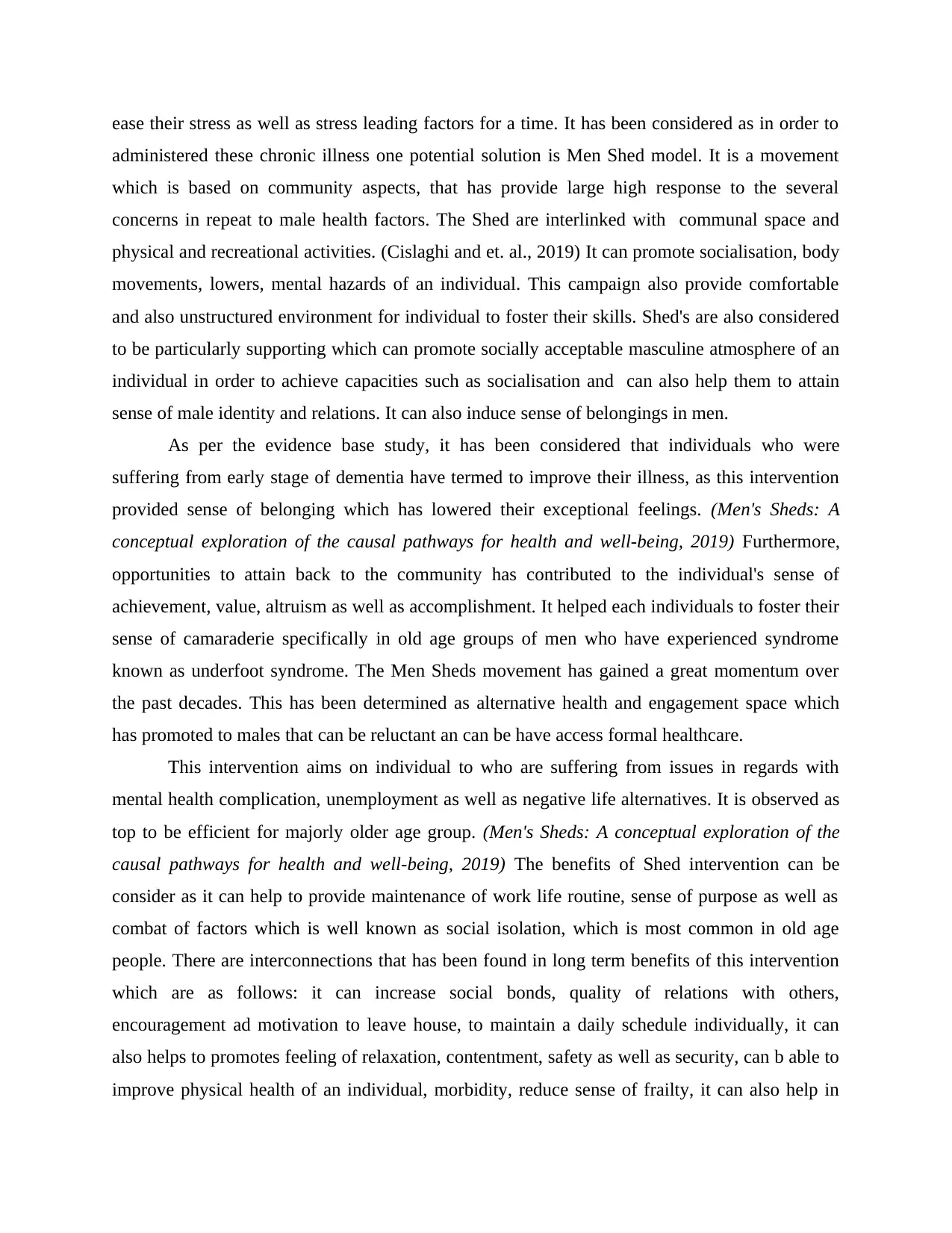
ease their stress as well as stress leading factors for a time. It has been considered as in order to
administered these chronic illness one potential solution is Men Shed model. It is a movement
which is based on community aspects, that has provide large high response to the several
concerns in repeat to male health factors. The Shed are interlinked with communal space and
physical and recreational activities. (Cislaghi and et. al., 2019) It can promote socialisation, body
movements, lowers, mental hazards of an individual. This campaign also provide comfortable
and also unstructured environment for individual to foster their skills. Shed's are also considered
to be particularly supporting which can promote socially acceptable masculine atmosphere of an
individual in order to achieve capacities such as socialisation and can also help them to attain
sense of male identity and relations. It can also induce sense of belongings in men.
As per the evidence base study, it has been considered that individuals who were
suffering from early stage of dementia have termed to improve their illness, as this intervention
provided sense of belonging which has lowered their exceptional feelings. (Men's Sheds: A
conceptual exploration of the causal pathways for health and well-being, 2019) Furthermore,
opportunities to attain back to the community has contributed to the individual's sense of
achievement, value, altruism as well as accomplishment. It helped each individuals to foster their
sense of camaraderie specifically in old age groups of men who have experienced syndrome
known as underfoot syndrome. The Men Sheds movement has gained a great momentum over
the past decades. This has been determined as alternative health and engagement space which
has promoted to males that can be reluctant an can be have access formal healthcare.
This intervention aims on individual to who are suffering from issues in regards with
mental health complication, unemployment as well as negative life alternatives. It is observed as
top to be efficient for majorly older age group. (Men's Sheds: A conceptual exploration of the
causal pathways for health and well-being, 2019) The benefits of Shed intervention can be
consider as it can help to provide maintenance of work life routine, sense of purpose as well as
combat of factors which is well known as social isolation, which is most common in old age
people. There are interconnections that has been found in long term benefits of this intervention
which are as follows: it can increase social bonds, quality of relations with others,
encouragement ad motivation to leave house, to maintain a daily schedule individually, it can
also helps to promotes feeling of relaxation, contentment, safety as well as security, can b able to
improve physical health of an individual, morbidity, reduce sense of frailty, it can also help in
administered these chronic illness one potential solution is Men Shed model. It is a movement
which is based on community aspects, that has provide large high response to the several
concerns in repeat to male health factors. The Shed are interlinked with communal space and
physical and recreational activities. (Cislaghi and et. al., 2019) It can promote socialisation, body
movements, lowers, mental hazards of an individual. This campaign also provide comfortable
and also unstructured environment for individual to foster their skills. Shed's are also considered
to be particularly supporting which can promote socially acceptable masculine atmosphere of an
individual in order to achieve capacities such as socialisation and can also help them to attain
sense of male identity and relations. It can also induce sense of belongings in men.
As per the evidence base study, it has been considered that individuals who were
suffering from early stage of dementia have termed to improve their illness, as this intervention
provided sense of belonging which has lowered their exceptional feelings. (Men's Sheds: A
conceptual exploration of the causal pathways for health and well-being, 2019) Furthermore,
opportunities to attain back to the community has contributed to the individual's sense of
achievement, value, altruism as well as accomplishment. It helped each individuals to foster their
sense of camaraderie specifically in old age groups of men who have experienced syndrome
known as underfoot syndrome. The Men Sheds movement has gained a great momentum over
the past decades. This has been determined as alternative health and engagement space which
has promoted to males that can be reluctant an can be have access formal healthcare.
This intervention aims on individual to who are suffering from issues in regards with
mental health complication, unemployment as well as negative life alternatives. It is observed as
top to be efficient for majorly older age group. (Men's Sheds: A conceptual exploration of the
causal pathways for health and well-being, 2019) The benefits of Shed intervention can be
consider as it can help to provide maintenance of work life routine, sense of purpose as well as
combat of factors which is well known as social isolation, which is most common in old age
people. There are interconnections that has been found in long term benefits of this intervention
which are as follows: it can increase social bonds, quality of relations with others,
encouragement ad motivation to leave house, to maintain a daily schedule individually, it can
also helps to promotes feeling of relaxation, contentment, safety as well as security, can b able to
improve physical health of an individual, morbidity, reduce sense of frailty, it can also help in
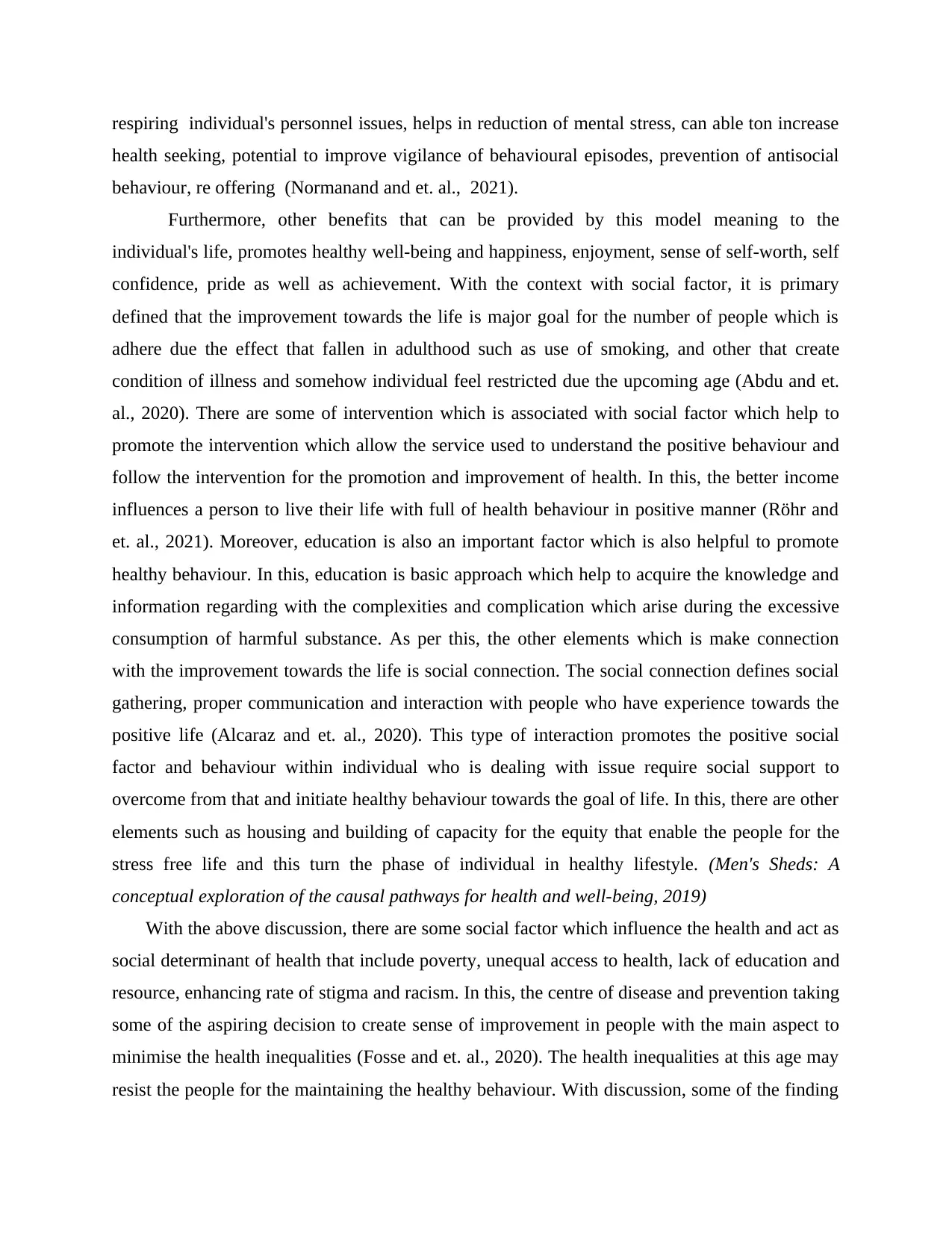
respiring individual's personnel issues, helps in reduction of mental stress, can able ton increase
health seeking, potential to improve vigilance of behavioural episodes, prevention of antisocial
behaviour, re offering (Normanand and et. al., 2021).
Furthermore, other benefits that can be provided by this model meaning to the
individual's life, promotes healthy well-being and happiness, enjoyment, sense of self-worth, self
confidence, pride as well as achievement. With the context with social factor, it is primary
defined that the improvement towards the life is major goal for the number of people which is
adhere due the effect that fallen in adulthood such as use of smoking, and other that create
condition of illness and somehow individual feel restricted due the upcoming age (Abdu and et.
al., 2020). There are some of intervention which is associated with social factor which help to
promote the intervention which allow the service used to understand the positive behaviour and
follow the intervention for the promotion and improvement of health. In this, the better income
influences a person to live their life with full of health behaviour in positive manner (Röhr and
et. al., 2021). Moreover, education is also an important factor which is also helpful to promote
healthy behaviour. In this, education is basic approach which help to acquire the knowledge and
information regarding with the complexities and complication which arise during the excessive
consumption of harmful substance. As per this, the other elements which is make connection
with the improvement towards the life is social connection. The social connection defines social
gathering, proper communication and interaction with people who have experience towards the
positive life (Alcaraz and et. al., 2020). This type of interaction promotes the positive social
factor and behaviour within individual who is dealing with issue require social support to
overcome from that and initiate healthy behaviour towards the goal of life. In this, there are other
elements such as housing and building of capacity for the equity that enable the people for the
stress free life and this turn the phase of individual in healthy lifestyle. (Men's Sheds: A
conceptual exploration of the causal pathways for health and well-being, 2019)
With the above discussion, there are some social factor which influence the health and act as
social determinant of health that include poverty, unequal access to health, lack of education and
resource, enhancing rate of stigma and racism. In this, the centre of disease and prevention taking
some of the aspiring decision to create sense of improvement in people with the main aspect to
minimise the health inequalities (Fosse and et. al., 2020). The health inequalities at this age may
resist the people for the maintaining the healthy behaviour. With discussion, some of the finding
health seeking, potential to improve vigilance of behavioural episodes, prevention of antisocial
behaviour, re offering (Normanand and et. al., 2021).
Furthermore, other benefits that can be provided by this model meaning to the
individual's life, promotes healthy well-being and happiness, enjoyment, sense of self-worth, self
confidence, pride as well as achievement. With the context with social factor, it is primary
defined that the improvement towards the life is major goal for the number of people which is
adhere due the effect that fallen in adulthood such as use of smoking, and other that create
condition of illness and somehow individual feel restricted due the upcoming age (Abdu and et.
al., 2020). There are some of intervention which is associated with social factor which help to
promote the intervention which allow the service used to understand the positive behaviour and
follow the intervention for the promotion and improvement of health. In this, the better income
influences a person to live their life with full of health behaviour in positive manner (Röhr and
et. al., 2021). Moreover, education is also an important factor which is also helpful to promote
healthy behaviour. In this, education is basic approach which help to acquire the knowledge and
information regarding with the complexities and complication which arise during the excessive
consumption of harmful substance. As per this, the other elements which is make connection
with the improvement towards the life is social connection. The social connection defines social
gathering, proper communication and interaction with people who have experience towards the
positive life (Alcaraz and et. al., 2020). This type of interaction promotes the positive social
factor and behaviour within individual who is dealing with issue require social support to
overcome from that and initiate healthy behaviour towards the goal of life. In this, there are other
elements such as housing and building of capacity for the equity that enable the people for the
stress free life and this turn the phase of individual in healthy lifestyle. (Men's Sheds: A
conceptual exploration of the causal pathways for health and well-being, 2019)
With the above discussion, there are some social factor which influence the health and act as
social determinant of health that include poverty, unequal access to health, lack of education and
resource, enhancing rate of stigma and racism. In this, the centre of disease and prevention taking
some of the aspiring decision to create sense of improvement in people with the main aspect to
minimise the health inequalities (Fosse and et. al., 2020). The health inequalities at this age may
resist the people for the maintaining the healthy behaviour. With discussion, some of the finding
⊘ This is a preview!⊘
Do you want full access?
Subscribe today to unlock all pages.

Trusted by 1+ million students worldwide
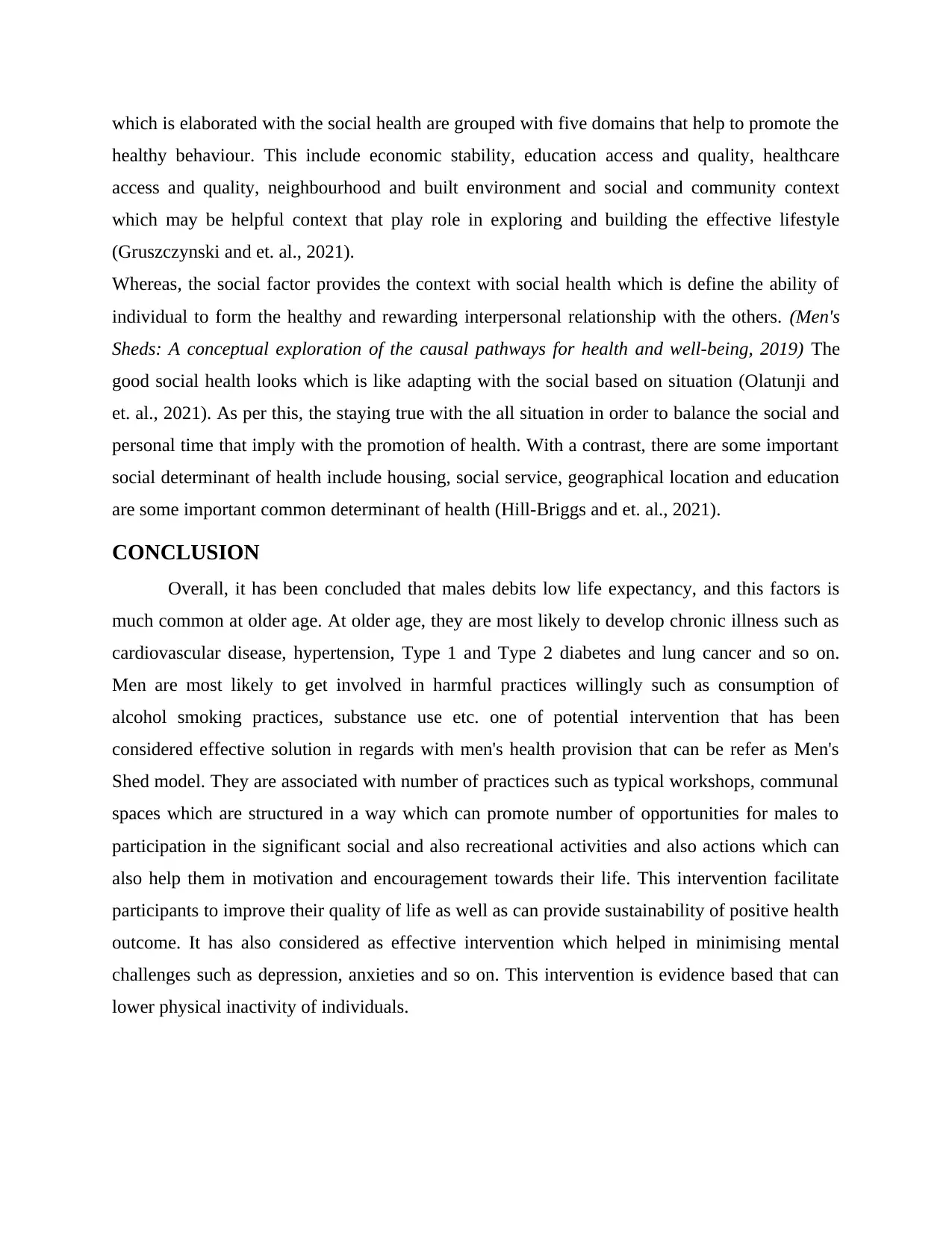
which is elaborated with the social health are grouped with five domains that help to promote the
healthy behaviour. This include economic stability, education access and quality, healthcare
access and quality, neighbourhood and built environment and social and community context
which may be helpful context that play role in exploring and building the effective lifestyle
(Gruszczynski and et. al., 2021).
Whereas, the social factor provides the context with social health which is define the ability of
individual to form the healthy and rewarding interpersonal relationship with the others. (Men's
Sheds: A conceptual exploration of the causal pathways for health and well-being, 2019) The
good social health looks which is like adapting with the social based on situation (Olatunji and
et. al., 2021). As per this, the staying true with the all situation in order to balance the social and
personal time that imply with the promotion of health. With a contrast, there are some important
social determinant of health include housing, social service, geographical location and education
are some important common determinant of health (Hill-Briggs and et. al., 2021).
CONCLUSION
Overall, it has been concluded that males debits low life expectancy, and this factors is
much common at older age. At older age, they are most likely to develop chronic illness such as
cardiovascular disease, hypertension, Type 1 and Type 2 diabetes and lung cancer and so on.
Men are most likely to get involved in harmful practices willingly such as consumption of
alcohol smoking practices, substance use etc. one of potential intervention that has been
considered effective solution in regards with men's health provision that can be refer as Men's
Shed model. They are associated with number of practices such as typical workshops, communal
spaces which are structured in a way which can promote number of opportunities for males to
participation in the significant social and also recreational activities and also actions which can
also help them in motivation and encouragement towards their life. This intervention facilitate
participants to improve their quality of life as well as can provide sustainability of positive health
outcome. It has also considered as effective intervention which helped in minimising mental
challenges such as depression, anxieties and so on. This intervention is evidence based that can
lower physical inactivity of individuals.
healthy behaviour. This include economic stability, education access and quality, healthcare
access and quality, neighbourhood and built environment and social and community context
which may be helpful context that play role in exploring and building the effective lifestyle
(Gruszczynski and et. al., 2021).
Whereas, the social factor provides the context with social health which is define the ability of
individual to form the healthy and rewarding interpersonal relationship with the others. (Men's
Sheds: A conceptual exploration of the causal pathways for health and well-being, 2019) The
good social health looks which is like adapting with the social based on situation (Olatunji and
et. al., 2021). As per this, the staying true with the all situation in order to balance the social and
personal time that imply with the promotion of health. With a contrast, there are some important
social determinant of health include housing, social service, geographical location and education
are some important common determinant of health (Hill-Briggs and et. al., 2021).
CONCLUSION
Overall, it has been concluded that males debits low life expectancy, and this factors is
much common at older age. At older age, they are most likely to develop chronic illness such as
cardiovascular disease, hypertension, Type 1 and Type 2 diabetes and lung cancer and so on.
Men are most likely to get involved in harmful practices willingly such as consumption of
alcohol smoking practices, substance use etc. one of potential intervention that has been
considered effective solution in regards with men's health provision that can be refer as Men's
Shed model. They are associated with number of practices such as typical workshops, communal
spaces which are structured in a way which can promote number of opportunities for males to
participation in the significant social and also recreational activities and also actions which can
also help them in motivation and encouragement towards their life. This intervention facilitate
participants to improve their quality of life as well as can provide sustainability of positive health
outcome. It has also considered as effective intervention which helped in minimising mental
challenges such as depression, anxieties and so on. This intervention is evidence based that can
lower physical inactivity of individuals.
Paraphrase This Document
Need a fresh take? Get an instant paraphrase of this document with our AI Paraphraser
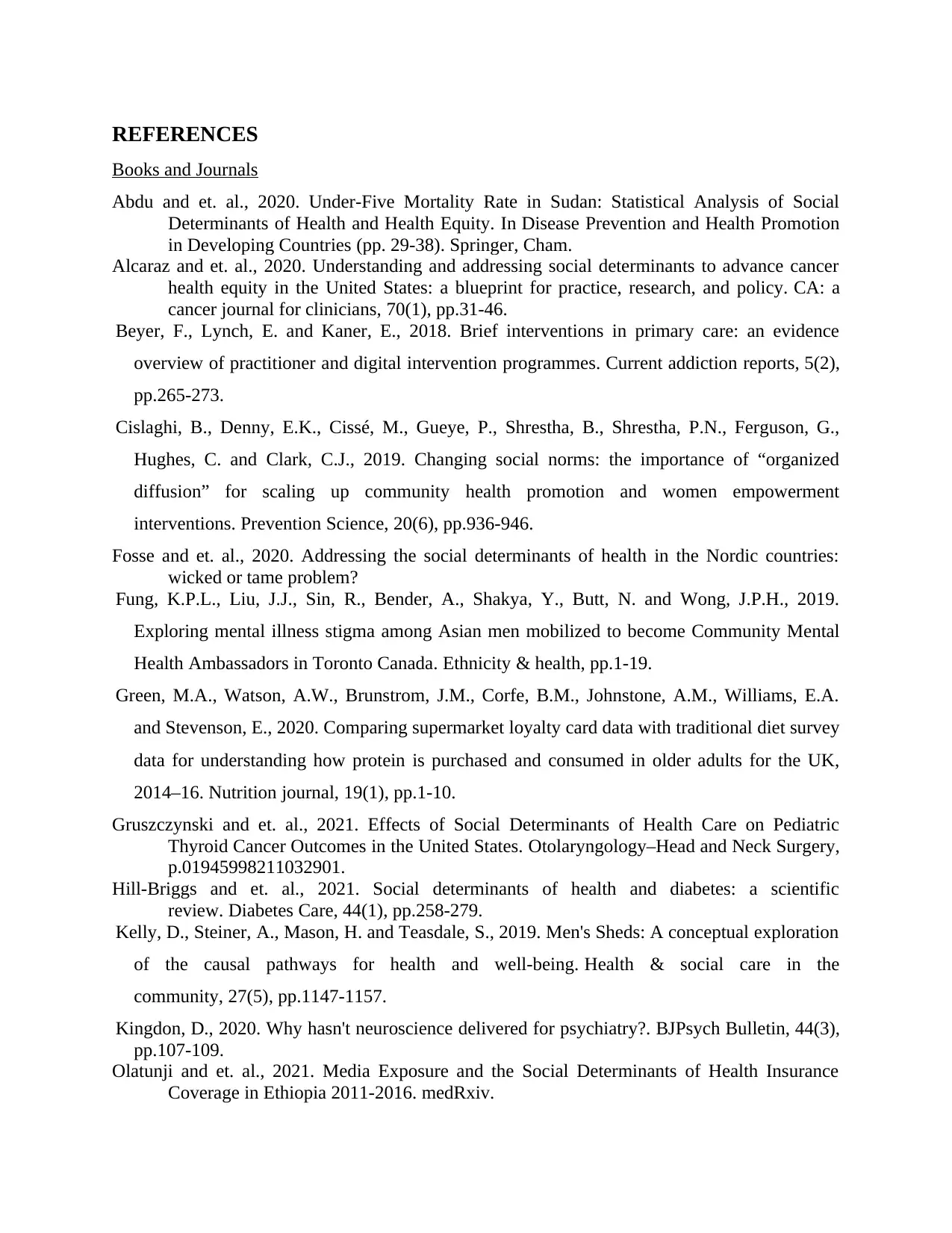
REFERENCES
Books and Journals
Abdu and et. al., 2020. Under-Five Mortality Rate in Sudan: Statistical Analysis of Social
Determinants of Health and Health Equity. In Disease Prevention and Health Promotion
in Developing Countries (pp. 29-38). Springer, Cham.
Alcaraz and et. al., 2020. Understanding and addressing social determinants to advance cancer
health equity in the United States: a blueprint for practice, research, and policy. CA: a
cancer journal for clinicians, 70(1), pp.31-46.
Beyer, F., Lynch, E. and Kaner, E., 2018. Brief interventions in primary care: an evidence
overview of practitioner and digital intervention programmes. Current addiction reports, 5(2),
pp.265-273.
Cislaghi, B., Denny, E.K., Cissé, M., Gueye, P., Shrestha, B., Shrestha, P.N., Ferguson, G.,
Hughes, C. and Clark, C.J., 2019. Changing social norms: the importance of “organized
diffusion” for scaling up community health promotion and women empowerment
interventions. Prevention Science, 20(6), pp.936-946.
Fosse and et. al., 2020. Addressing the social determinants of health in the Nordic countries:
wicked or tame problem?
Fung, K.P.L., Liu, J.J., Sin, R., Bender, A., Shakya, Y., Butt, N. and Wong, J.P.H., 2019.
Exploring mental illness stigma among Asian men mobilized to become Community Mental
Health Ambassadors in Toronto Canada. Ethnicity & health, pp.1-19.
Green, M.A., Watson, A.W., Brunstrom, J.M., Corfe, B.M., Johnstone, A.M., Williams, E.A.
and Stevenson, E., 2020. Comparing supermarket loyalty card data with traditional diet survey
data for understanding how protein is purchased and consumed in older adults for the UK,
2014–16. Nutrition journal, 19(1), pp.1-10.
Gruszczynski and et. al., 2021. Effects of Social Determinants of Health Care on Pediatric
Thyroid Cancer Outcomes in the United States. Otolaryngology–Head and Neck Surgery,
p.01945998211032901.
Hill-Briggs and et. al., 2021. Social determinants of health and diabetes: a scientific
review. Diabetes Care, 44(1), pp.258-279.
Kelly, D., Steiner, A., Mason, H. and Teasdale, S., 2019. Men's Sheds: A conceptual exploration
of the causal pathways for health and well‐being. Health & social care in the
community, 27(5), pp.1147-1157.
Kingdon, D., 2020. Why hasn't neuroscience delivered for psychiatry?. BJPsych Bulletin, 44(3),
pp.107-109.
Olatunji and et. al., 2021. Media Exposure and the Social Determinants of Health Insurance
Coverage in Ethiopia 2011-2016. medRxiv.
Books and Journals
Abdu and et. al., 2020. Under-Five Mortality Rate in Sudan: Statistical Analysis of Social
Determinants of Health and Health Equity. In Disease Prevention and Health Promotion
in Developing Countries (pp. 29-38). Springer, Cham.
Alcaraz and et. al., 2020. Understanding and addressing social determinants to advance cancer
health equity in the United States: a blueprint for practice, research, and policy. CA: a
cancer journal for clinicians, 70(1), pp.31-46.
Beyer, F., Lynch, E. and Kaner, E., 2018. Brief interventions in primary care: an evidence
overview of practitioner and digital intervention programmes. Current addiction reports, 5(2),
pp.265-273.
Cislaghi, B., Denny, E.K., Cissé, M., Gueye, P., Shrestha, B., Shrestha, P.N., Ferguson, G.,
Hughes, C. and Clark, C.J., 2019. Changing social norms: the importance of “organized
diffusion” for scaling up community health promotion and women empowerment
interventions. Prevention Science, 20(6), pp.936-946.
Fosse and et. al., 2020. Addressing the social determinants of health in the Nordic countries:
wicked or tame problem?
Fung, K.P.L., Liu, J.J., Sin, R., Bender, A., Shakya, Y., Butt, N. and Wong, J.P.H., 2019.
Exploring mental illness stigma among Asian men mobilized to become Community Mental
Health Ambassadors in Toronto Canada. Ethnicity & health, pp.1-19.
Green, M.A., Watson, A.W., Brunstrom, J.M., Corfe, B.M., Johnstone, A.M., Williams, E.A.
and Stevenson, E., 2020. Comparing supermarket loyalty card data with traditional diet survey
data for understanding how protein is purchased and consumed in older adults for the UK,
2014–16. Nutrition journal, 19(1), pp.1-10.
Gruszczynski and et. al., 2021. Effects of Social Determinants of Health Care on Pediatric
Thyroid Cancer Outcomes in the United States. Otolaryngology–Head and Neck Surgery,
p.01945998211032901.
Hill-Briggs and et. al., 2021. Social determinants of health and diabetes: a scientific
review. Diabetes Care, 44(1), pp.258-279.
Kelly, D., Steiner, A., Mason, H. and Teasdale, S., 2019. Men's Sheds: A conceptual exploration
of the causal pathways for health and well‐being. Health & social care in the
community, 27(5), pp.1147-1157.
Kingdon, D., 2020. Why hasn't neuroscience delivered for psychiatry?. BJPsych Bulletin, 44(3),
pp.107-109.
Olatunji and et. al., 2021. Media Exposure and the Social Determinants of Health Insurance
Coverage in Ethiopia 2011-2016. medRxiv.
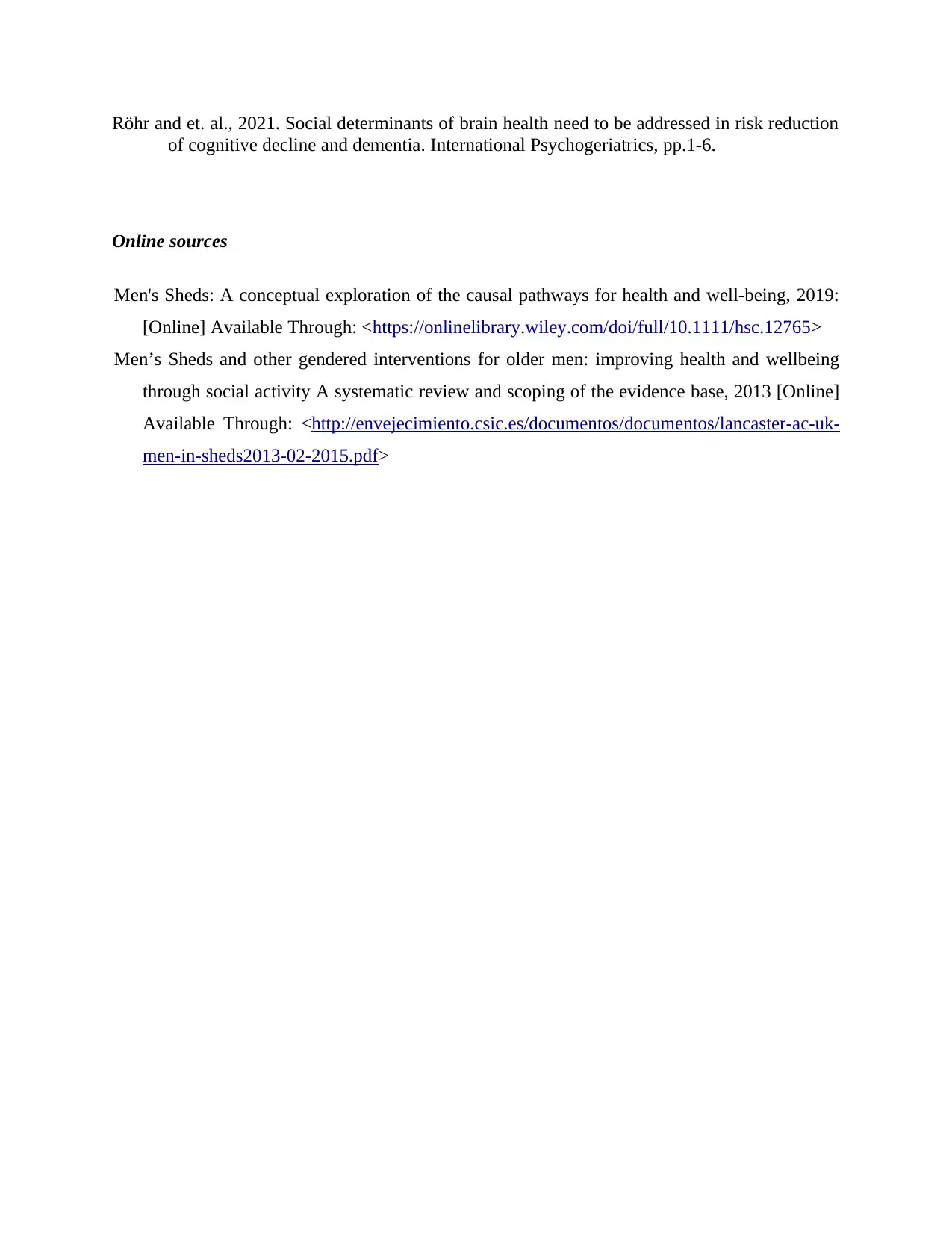
Röhr and et. al., 2021. Social determinants of brain health need to be addressed in risk reduction
of cognitive decline and dementia. International Psychogeriatrics, pp.1-6.
Online sources
Men's Sheds: A conceptual exploration of the causal pathways for health and well-being, 2019:
[Online] Available Through: <https://onlinelibrary.wiley.com/doi/full/10.1111/hsc.12765>
Men’s Sheds and other gendered interventions for older men: improving health and wellbeing
through social activity A systematic review and scoping of the evidence base, 2013 [Online]
Available Through: <http://envejecimiento.csic.es/documentos/documentos/lancaster-ac-uk-
men-in-sheds2013-02-2015.pdf>
of cognitive decline and dementia. International Psychogeriatrics, pp.1-6.
Online sources
Men's Sheds: A conceptual exploration of the causal pathways for health and well-being, 2019:
[Online] Available Through: <https://onlinelibrary.wiley.com/doi/full/10.1111/hsc.12765>
Men’s Sheds and other gendered interventions for older men: improving health and wellbeing
through social activity A systematic review and scoping of the evidence base, 2013 [Online]
Available Through: <http://envejecimiento.csic.es/documentos/documentos/lancaster-ac-uk-
men-in-sheds2013-02-2015.pdf>
⊘ This is a preview!⊘
Do you want full access?
Subscribe today to unlock all pages.

Trusted by 1+ million students worldwide
1 out of 9
Related Documents
Your All-in-One AI-Powered Toolkit for Academic Success.
+13062052269
info@desklib.com
Available 24*7 on WhatsApp / Email
![[object Object]](/_next/static/media/star-bottom.7253800d.svg)
Unlock your academic potential
Copyright © 2020–2026 A2Z Services. All Rights Reserved. Developed and managed by ZUCOL.




